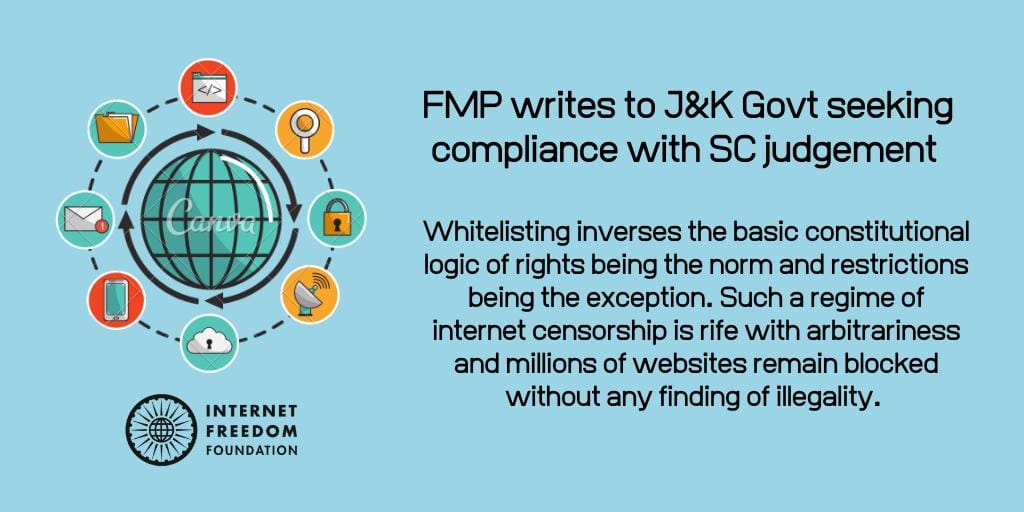
Tl;dr
Foundation for Media Professionals (FMP) sent a representation to the Government of Jammu & Kashmir demanding compliance with the guidelines laid down by the Supreme Court in Anuradha Bhasin v. Union of India. FMP was an intervenor in the case, and its representation criticises the whitelisting regime of internet censorship currently prevailing in Jammu & Kashmir for being unconstitutional and technically infeasible. In addition to this, FMP has also sought disclosure of all past orders and recommendations of the Review Committee.
Status of Restrictions
After the Supreme Court delivered its judgement in Anuradha Bhasin v. Union of India on 10 January, the Government of Jammu & Kashmir has partially restored internet access through multiple orders. Through the order issued on 24 January, only 2G internet access has been provided to the residents of Jammu and Kashmir to access 301 whitelisted websites while millions of other websites remain blocked. Notably, websites of political parties and social media platforms continue to remain blocked in Jammu and Kashmir.
Whitelisting is Unconstitutional
A whitelisting regime of internet censorship is unconstitutional because it inverses the constitutional design of fundamental rights being the norm and restrictions being the exception. For these reasons, Section 69A, IT Act 2000 empowers the government to block access to websites hosting illegal content after following proper procedure. However, until such websites are specifically identified and blocked after following the prescribed procedure, the default position is that all websites remain accessible. If the Government is concerned about misinformation and incitement of violence, it may selectively blacklist websites which contain illegal content but it cannot impose a generic ban on all websites and selectively whitelist certain websites.
By inverting the basic logic underpinning our Constitution, whitelisting makes arbitrary state action inevitable. Since government officials do not have to apply their mind before blocking access to a specific website, many websites are not whitelisted merely because government officials are not aware of them. There is also no explanation provided regarding why certain websites remain blocked while other websites belonging to the same category are whitelisted.
Whitelisting is Technically Infeasible
In the last week, there has been some excellent analysis by Rohini Lakshane, Prateek Waghre and others on why a whitelisting regime of censorship is not technically feasible owing to the interconnected nature of the internet. Drawing on this research, the representation highlights that 301 websites which have been whitelisted by the government will be fully functional only if the web application is permitted to make network calls to other websites to load JavaScript, style sheets, maps, videos, images, analytics etc. For instance, having access to an e-commerce platform like Amazon is meaningless unless the customer is also able to see images of the product that he/she wants to buy. Further, in many cases, while the website’s main domain has been whitelisted, its subdomains which contain the log in page or other important features remain blocked. Therefore, a large number of these 301 websites are not practically usable for the residents of Jammu and Kashmir.
No Disclosure of Past Orders
In its judgement in Anuradha Bhasin v. Union of India, the Supreme Court has held that the government must proactively publish all orders issued under Section 144, Code of Criminal Procedure, 1973 and the Temporary Telecom Suspension Rules, 2017. The Supreme Court has also clarified that the government cannot cite administrative inconvenience to refuse publication of orders. However, despite this explicit direction, the Government of Jammu & Kashmir has not published past orders issued between 05 August 2019 to 14 January 2020 on its website or any publically accessible forum.
No Disclosure of Review Committee Recommendations
The Supreme Court has mandatorily directed the Review Committee constituted under the Temporary Telecom Suspension Rules, 2017 to periodically review the need for suspension of telecommunication services every seven working days. However, there is no information available in the public domain about whether the Review Committee has complied with this direction and what recommendations were made by the Review Committee, if any.
Lawyers retained by IFF represented FMP before the Supreme Court and provided drafting assistance for this representation. We will continue supporting individuals and organizations seeking restoration of internet services in Jammu and Kashmir and all across India.
Important Documents
- Representation sent to J&K Govt by FMP (link)
